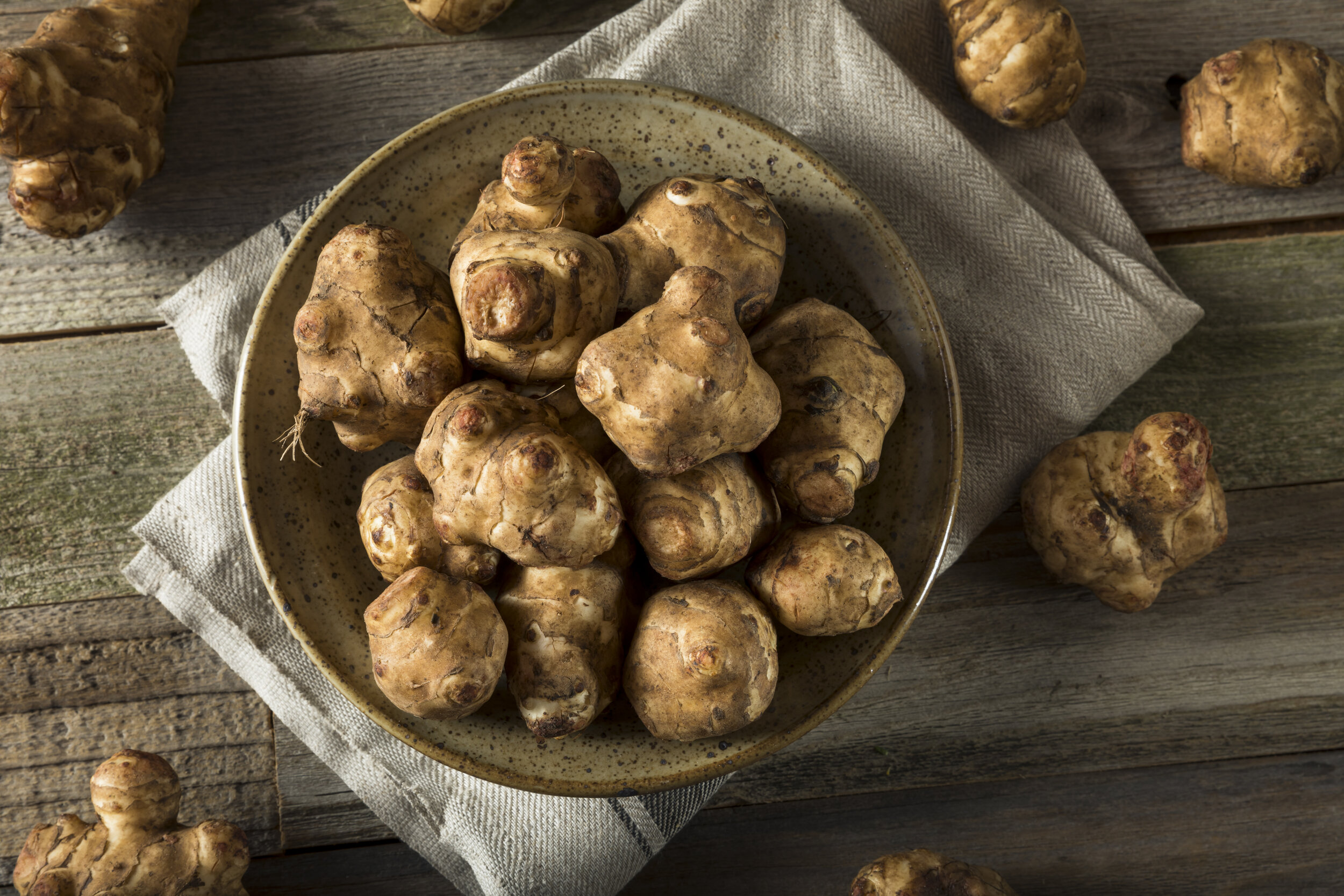Jerusalem Artichokes—Imperfectly Delicious
Jerusalem artichokes (also known as Sunchokes) are the ultimate “Imperfectly Delicious” vegetable: knobbly, undistinguished brown in color, and full of crevices where dirt can hide. But they are actually quite easy to prepare, tasty, and good for us.
by Lisa Barclay
RECIPES INCLUDED IN THIS POST
Jerusalem Artichoke, Black Radish, and Apple Salad
Warm Romaine Salad
Jerusalem Artichoke Au Gratin
Potato Pancakes
Crispy Jerusalem Artichokes with Aged Balsamic
Jerusalem artichokes (also known as Sunchokes) are the ultimate “Imperfectly Delicious” vegetable: knobbly, undistinguished brown in color, and full of crevices where dirt can hide. But they are actually quite easy to prepare, tasty, and good for us.
Jerusalem artichokes are not from Jerusalem, nor are they artichokes, although they do taste a little like artichoke hearts. The tubers are actually native to North America. They’re related to the sunflower, which is girasole in Italian, a word that somehow morphed into Jerusalem.
Jerusalem artichokes contain important vitamins and minerals and, apparently, can also help the body absorb calcium as well as maintain healthy blood sugar levels.
In addition, Jerusalem artichokes contain a substantial amount of inulin, which is a prebiotic dietary fiber. We’ve all heard about probiotics, the beneficial bacteria in foods like yogurt, miso, kefir, and krauts. Prebiotics go a step further, feeding the beneficial bacteria in our gut, helping to support a healthy and diverse microbiome. The list of foods that are prebiotic is long—from apples to yams—but they tend to be whole foods. (If you are interested, there is naturally a lot of information online. One place to start is the Mayo Clinic website: https://www.mayoclinic.org/prebiotics-probiotics-and-your-health/art-20390058.)
While Jerusalem artichokes are a great source of prebiotic fiber, there can be a down side for some people. Like beans, Jerusalem artichokes can cause gastric distress if you eat too much at one time. Those bacteria in your gut digest the inulin and turn it into gas, and too much can actually be painful. So as with beans, start with small amounts—one smallish tuber a day, or less—and work up. I like to shred a little in salads for crunch.
Jerusalem artichokes are actually not hard to prepare. You don’t need to peel them—which can be difficult with those little knobs—just rinse, scrub well, and rinse again. Break off the knobs and wash them separately. Then use the tubers in any recipe where you might use potatoes—roast, boil, bake, saute, steam—substituting some of the potato with Jerusalem artichoke. As a bonus, unlike potatoes, you can also eat them raw, so feel free to slice them into salads and slaws or sprinkle julienned bits over stews. Store them basically as you would carrots.
Ask in the Produce Department for the handout on Jerusalem artichokes with more recipes.
Jerusalem Artichoke, Black Radish, and Apple Salad
adapted from a Saveur recipe
This is the recipe I demoed in the store, using Red Dog JAs and Black Radish as well as staff-favorite Honey Bee apples.
Ingredients
1⁄4 cup extra-virgin olive oil
1-2 tbsp. rice vinegar
1-2 tbsp. fresh lemon juice
Zest from the lemon (optional)
Salt and freshly ground pepper to taste
1 Black radish, trimmed and very thinly sliced (or 2-4 of any kind radish)
2-3 Jerusalem artichokes, scrubbed and very thinly sliced
1 Honey Bee apple, cored and very thinly sliced (or any sweet tart apple)
Preparation
Whisk together the first 5 ingredients in the bottom of a bowl. Add the rest of the ingredients and toss well.
You can also add thinly sliced fennel bulb or, really, any veggie or lettuce that strikes your fancy.
Jerusalem Artichoke Au Gratin
Virginia in Produce says this is a great recipe.
Ingredients
2 lbs. Jerusalem artichokes, scrubbed
1/2 cup parmesan, grated
2 tablespoons butter, in pieces
Salt and pepper
Preparation
Boil the Jerusalem artichokes until just tender and slice them thinly. Lay in a buttered casserole dish and sprinkle with salt and pepper. Cover with the cheese and pieces of butter, and bake at 375 until cheese is melted and browned, about 8-10 minutes.
Jerusalem Artichoke & Squash Soup
from Red Dog Farm
Ingredients
1- 2 lbs. Jerusalem artichokes, washed and cut 1/4 inch
1/2-1 butternut squash, peeled and cut into 1 inch cubes
1 bell pepper, seeded and sliced 1/4 inch
1 onion, diced
2 cloves garlic, minced
1 sprig fresh rosemary
5 cups chicken or veg stock (plus or minus)
Olive oil
Preparation
Heat about 2 tablespoons of olive oil in a large pot over medium-high heat. Add the onion, garlic, and bell pepper, and season with salt and pepper. Cook about 5-6 minutes, stirring often, until onions are soft and translucent. Add the cubed butternut squash, sliced Jerusalem artichokes, and sprig of rosemary and stir to combine. Add about 5 cups of broth, just covering vegetables (use slightly more or less as needed). Bring the pot to a boil, then reduce to a low simmer and cover. Let cook about 30-40 minutes, until butternut squash and Jerusalem artichokes are very soft. Remove rosemary. In batches, puree the vegetable mixture in a blender and transfer to another pot (or return to the same, but using a new pot simplifies the process). Bring the pureed mixture to a low simmer, adding more stock to thin the soup if necessary.
Potato Pancakes
from Nash’s website
Ingredients
1 large baking potato
1/2 medium onion
1/2 cup Jerusalem artichokes
1 large egg
1 tablespoon chopped parsley
1 tablespoon flour (Nash’s, of course)
1 tablespoon dry bread crumbs
1/4 teaspoon dry thyme
Juice of 1 lemon
Salt and pepper
Oil for pan frying
1/3 cup applesauce
Preparation
Using a food processor or a box grater, coarsely grate the potato, onion and Jerusalem artichokes into a bowl. Using your hands, squeeze out the excess liquid and place the mixture in another bowl. Add the egg, parsley, flour, breadcrumbs, thyme, lemon juice and seasonings. Mix well.
Heat 1/2 cup of oil in a heavy skillet. Add 1/2 cup mounds of mixture to the hot oil, and flatten down to a 3/4-inch thick pancake. Turn heat to medium. Cook for 5 minutes on each side or until crispy and golden. Serve with the applesauce.
Crispy Jerusalem Artichokes with Aged Balsamic
from Bon Appetit
Ingredients
2 tablespoons olive oil
2 pounds small Jerusalem artichokes, scrubbed, quartered
Kosher salt and freshly ground black pepper
4 sprigs rosemary
1⁄4 cup (1⁄2 stick) unsalted butter
3 tablespoons aged balsamic vinegar
Preparation
Heat oil in a large skillet, preferably cast iron (you’ll need a lid), over medium-high heat. Add Jerusalem artichokes and 1⁄4 cup water and season with salt and pepper. Cover and cook, stirring occasionally, until Jerusalem artichokes are fork-tender, 8–10 minutes.
Uncover skillet and cook, stirring occasionally, until water is evaporated and Jerusalem artichokes begin to brown and crisp, 8–10 minutes longer; transfer to a platter.
Add rosemary and butter to skillet and cook, stirring often, until butter foams, then browns, about 4 minutes. Remove skillet from heat and stir in vinegar, scraping up any browned bits. Spoon brown butter sauce and rosemary over Jerusalem artichokes.

